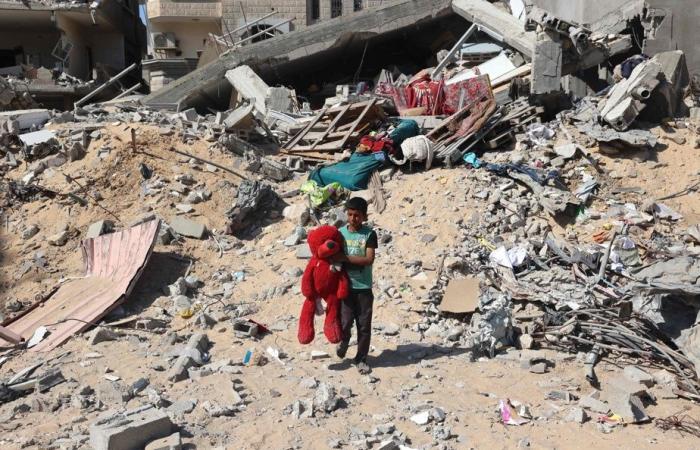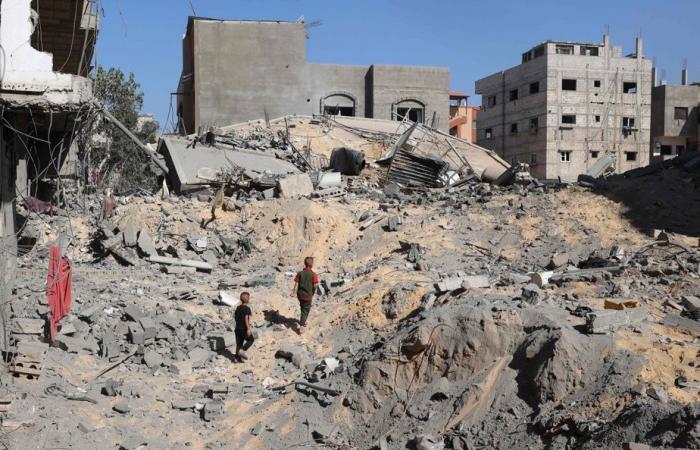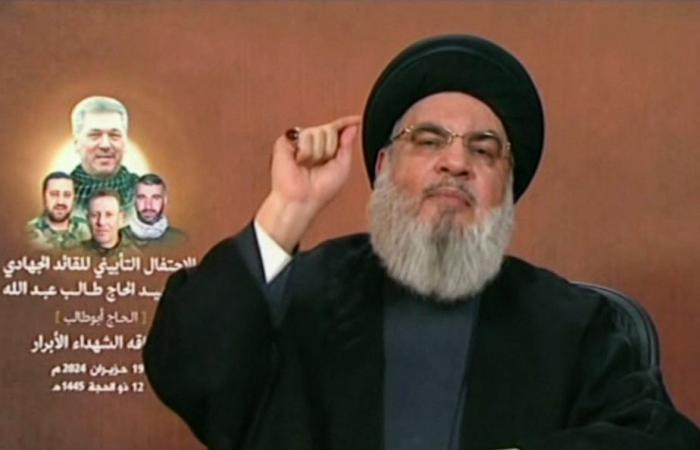The Israeli army intensified its strikes on the Gaza Strip on Friday, in which at least 30 Palestinians were killed according to doctors, and exchanged new cross-border fire with Lebanese Hezbollah.
Posted at 6:29 a.m.
Updated at 12:29 p.m.
Lebanon cannot become “another Gaza”, launched UN boss Antonio Guterres, highlighting fears of a regional conflagration with the increase in shootings on the Israeli-Lebanese border and the threats brandished by Israel and Hezbollah, a movement armed and financed by Iran.
The war in Gaza, triggered by a bloody attack by the Palestinian Islamist movement Hamas on October 7 against Israeli soil, has also caused new tensions between Israel and the United States, historic allies, with Prime Minister Benjamin Netanyahu criticizing the pace deliveries of American military aid.
On Friday, Israeli aerial and artillery bombardments intensified according to witnesses in several sectors of the Palestinian territory besieged by Israel since October 9.
“It was a difficult and very violent day in Gaza City (North). So far, around 30 martyrs have been transported to Al-Ahli Hospital,” said Dr.r Fadel Naïm, director of the establishment.
The strikes also targeted the town of Rafah in the south where the army reported fighting with Hamas.
According to the World Health Organization (WHO), as of May 17, there were only 750 people left in Rafah, while the city was home to 1.4 million Palestinians, the vast majority of whom fled after the Israeli ground offensive launched. on May 7.
In this small territory where some 2.4 million Palestinians are crowded together, “more than a million people are constantly on the move” in the hope of finding a safe place while “no place is safe”, said the Dr Thanos Gargavanis, head of emergencies at WHO.
” Bridging the gap “
Furthermore, the government of Qatar assured Friday that it was continuing its mediation efforts in order to “bridge the gap” between Israel and Hamas and achieve a ceasefire in the Gaza Strip and the release of hostages. retained by the Palestinian Islamist movement.
“We continued our efforts [de médiation, NDLR] without interruption in recent days,” assured the Prime Minister of Qatar, Sheikh Mohammed ben Abdelrahmane Al-Thani, during a joint press conference in Madrid with the Spanish Minister of Foreign Affairs, José Manuel Albares.
PHOTO JUAN MEDINA, REUTERS
Qatar’s Prime Minister, Sheikh Mohammed bin Abdelrahmane Al-Thani, during a press conference in Madrid
“There have been several meetings with the Hamas leadership to try to bridge the gap between the two sides and reach an agreement that results in a ceasefire and the release of the hostages,” he continued. .
Hamas leader Ismaïl Haniyeh confirmed Friday that his movement was open to examining “any document or initiative guaranteeing the foundations of the resistance’s position in the ceasefire negotiations,” in a statement.
In his speech, Haniyeh once again demanded “a permanent ceasefire” before considering an exchange of prisoners, specifying that “the priority is to end the war…
“No impact”
On October 7, Hamas commandos infiltrated from Gaza carried out an attack in southern Israel which resulted in the deaths of 1,194 people, mostly civilians, according to an AFP count based on official data. Of the 251 people kidnapped that day, 116 are still being held in Gaza, 41 of whom are dead.
In response, Israel promised to destroy Hamas, in power in Gaza since 2007 and which it considers terrorist, as do the United States and the European Union.
His army launched a major offensive in Gaza that has so far killed 37,431 people, mostly civilians, according to data from the health ministry of the local Hamas-led government.
The Israeli army announced the death of two soldiers, bringing to more than 310 the number of soldiers killed since the start of ground operations in Gaza on October 27.
Despite the humanitarian disaster in the Palestinian territory threatened with famine according to the UN, international aid cannot be transported and distributed by humanitarians due to the lack of security, according to the WHO.
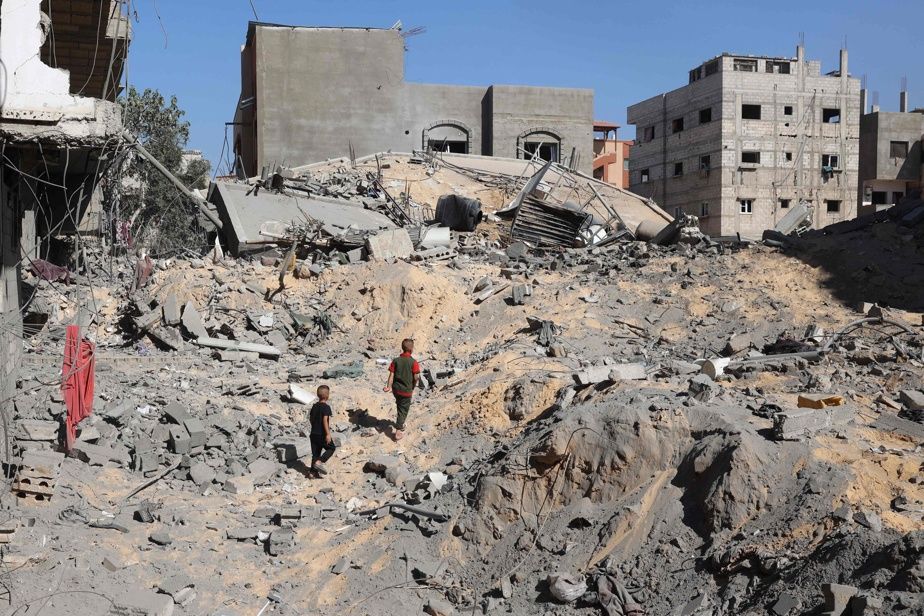
PHOTO EYAD BABA, AGENCE FRANCE-PRESSE
Children walk among the rubble of a building destroyed following an Israeli bombardment in Khan Yunis on June 21.
A daily break announced by Israel on a southern route, and presented as a way to facilitate the entry of aid through the Israeli Kerem Shalom crossing into Gaza, had “no impact”, the WHO said. The entry of aid “has been minimal” and collecting it at Kerem Shalom is dangerous.
Tensions between Israel and Washington
Mr. Netanyahu said Israel was waging “a war for its existence” in Gaza and needed American weapons, amid tensions with the United States.
On Tuesday he accused the United States, Israel’s primary military supporter, of “withholding” arms deliveries.
Comments deemed “disappointing” and “offensive” by John Kirby, spokesperson for the National Security Council, for whom “no other country does more to help Israel defend itself against the threat of Hamas”.
Secretary of State Antony Blinken, who met with Israeli officials in Washington on Thursday, wanted to “reiterate the United States’ unwavering commitment to Israel’s security.”
“Unimaginable”
Mr. Blinken also underlined “the importance of avoiding a new escalation in Lebanon”, a country located on the northern border of Israel and where Hezbollah, a very influential movement in Lebanon, has opened the front in support of Hamas, his ally, October 8.
Hassan Nasrallah, the leader of Hezbollah, warned on Wednesday that “no place” in Israel would be spared from his movement’s missiles after the Israeli army announced that “operational plans for an offensive in Lebanon” had been ” validated”.
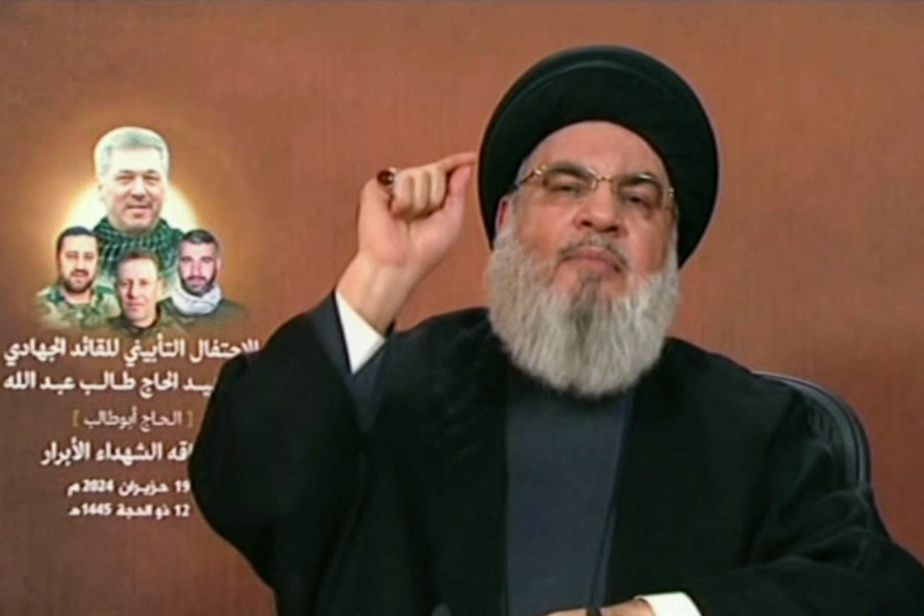
PHOTO AL-MANAR, AGENCE FRANCE-PRESSE
Hezbollah leader Hassan Nasrallah
On Friday, Hezbollah said it launched explosive drones at a military position on Israel’s northern border and carried out rocket and drone attacks against other border military targets.
In Lebanon, media reported Israeli strikes and bombings against several locations in southern Lebanon.
“The risk of the conflict spreading to the Middle East is real and must be avoided. A rash move, a miscalculation, could cause a catastrophe well beyond the border, and frankly unimaginable,” warns Mr. Guterres.

